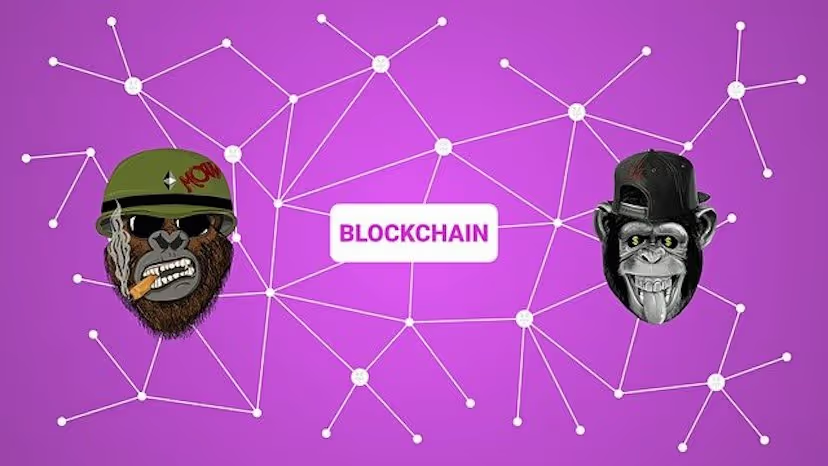NFT hype: Insanity or store of value?

Since artist Beeple sold his digital NFT collage “Everydays: The First 5000 Days” for over 69 million dollars in 2021, many investors have been in the non-fungible token fever. But the current market euphoria is sometimes blooming dubiously and could — as is so often the case — lead to general disillusionment. Learn about the risks and opportunities NFT and the underlying blockchain technology.
Follow the endless euphoria...
A pixelated”Cyberpunk face for 11.2 million dollars. A tweet for 2.9 million dollars. Pictures of bored monkeys for several hundred thousand dollars. Prices for NFT have risen to breath-taking heights in recent months. Countless digital “unique items” are produced on specialized platforms such as OpenSea or sells Rarible as so-called NFTs. In other words, virtual objects or goods that are traded decentrally via the blockchain. Each NFT promises uniqueness. The buyer is registered as an owner on the blockchain and can thus provide a certificate of authenticity for their virtual object. Unlike other tokens or cryptocurrencies, Non-Fungible Tokens are not divisible and must be bought or sold as a whole. In order to trade and store NFTs, buyers need a compatible wallet such as MetaMask.
Some recent use cases for NFT include:
- art market: Digital works of art are exhibited and sold on special platforms such as Rarible. Art represents by far the largest area of application for NFTs and is largely responsible for the current hype.
- Metaverse/Gaming: Avatars, skins, or plots of land are popular items that are traded as NFT in games such as Decentraland or Sandbox.
- Collectibles: What used to be Panini collectibles are now CryptoKitties, NBA Top Shot cards or the Fantasy Football Game Sorare, where users can buy tokenized versions of their favorite players, for example.
- music: Streaming and MP3 files have reduced artists' sources of income in recent decades. Music NFTs open up new opportunities to market works as unique items or to obtain licensing fees without intermediaries such as record labels.
- Branding: Major brands such as Nike, Samsung and Adidas are already using NFT to present new products, test innovative forms of customer interaction or market special editions of their articles as digital items.
- documents: ID, driver's license or vaccination certificate can be secured against manipulation and theft via NFT and would thus be available anywhere and at any time.
- industry: Using NFTs can provide evidence of each product's originality. Whether high-quality branded goods, spare parts or medicines: goods of all types can be checked for authenticity by tracing them back to the original manufacturer.
... the merciless crash?
It is not yet foreseeable which NFT applications will prevail in the future or whether the current hype surrounding NFT art and collectibles will significantly subside. stats It is true that the trend is still upwards: The total NFT trading volume in the first quarter of 2020 was an estimated 15.3 million dollars. In Q1 2021, it was already over two billion dollars and in Q4 2021 was an incredible 11.6 billion dollars with NFT implemented. However, skeptics, such as Fred Ehrsam, co-founder of crypto trading platform Coinbase, predict that the “NFT bubble” will burst sooner or later. In an interview, he stated that, in his opinion, 90 percent of all NFTs produced in three to five years are only of low value would be and drew parallels to the dot-com bubble of the 90s.
With the current prevailing euphoria surrounding NFT, criminal activity based on it also increased. These include wash trading to artificially increase the value of a collection and money laundering.
Risky NFT markets
Wash trading is the execution of a transaction in which seller and buyer are the same. The NFT is “sold” to a new wallet for a high price, but it belongs to the original owner. As a result, an NFT can appear more valuable than it actually is. Since the majority of NFT trading platforms allow users to trade without complex registration procedures, this is easy to do.
In a recent report from Chainalysis, the extent of wash trading becomes clear: Chainalysis tracked crypto assets worth more than 44 billion dollars in 2021 and was able to identify 110 wash traders who made a total profit of almost 8.9 million dollars.
According to study data, money laundering using NFT is still relatively small amounts. However, money laundering poses a major risk to the trustworthiness of NFT and should therefore be monitored more closely by marketplaces, regulatory and law enforcement agencies.
In addition to fraud and money laundering, NFTs are also subject to other investment risks. These include, for example, theft through hacker attacks or scams as well as the lack of regulation by supervisory authorities.
Regulated investment tokens
But not all tokens are the same. For a better classification, there are generally three basic forms: tokens with payment function (payment or currency token), tokens used for investment (security or Investment Token) and access keys for goods and services (utility tokens). For example, while investment tokens have already been used as securities-related assets by Bafin are regulated, NFTs are still in a legal grey area with very different international classifications and low investor protection.
Because of the predominant risks of NFT, investors should consider alternatives that represent actual physical assets. Auch real works of art, classic cars, real estate or diamonds can be digitally represented and traded on the blockchain in the form of investment tokens. These alternative, innovative investment options have several and decisive advantages for investors: real tangible assets, legal frameworks, reputable trading platforms and the option of denomination starting at the equivalent of 500 euros.



